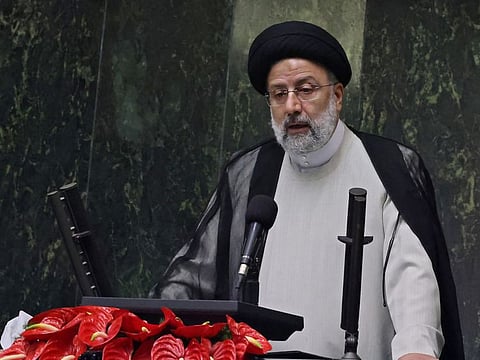Iran President picks hawkish diplomat to lead nuclear talks
Parliament will debate choices for a week before voting to approve or reject nominees

Tehran: Iran’s new president picked a hawkish Foreign Ministry veteran with close ties to the military elite to replace Mohammad Javad Zarif as the nation’s top diplomat, underscoring the shift in power that’s clouding the resumption of nuclear talks with world powers.
Hossein Amirabdollahian, a fluent Arabic speaker and previously deputy foreign minister for Arab and African affairs, was proposed for the role in a list of cabinet ministers presented to lawmakers on Wednesday by President Ebrahim Raisi.
Parliament will debate the choices for a week before voting to approve or reject the nominees. Raisi also nominated Javad Owji as oil minister.
If approved, the 57-year-old Amirabdollahian, an anti-Western conservative considered close to the Islamic Revolutionary Guard Corps as well as Lebanon’s Hezbollah militant movement, will steer Iran’s negotiating team once talks resume in Vienna over how to revive the 2015 nuclear deal.
His oversight could see Iran seek to drive a harder bargain over rolling back its rapidly expanding nuclear programme in return for sanctions relief, and perhaps even topple the process.
But if the sides can move forward, the fact that Amirabdollahian’s views are in line with those of the Guard and Supreme Leader Ayatollah Ali Khamenei could be advantageous, said Ali Vaez, director of the Iran Project at the International Crisis Group.
Amirabdollahian would be a “more difficult interlocutor for the West but a more capable one, as he will face much less internal resistance to his initiatives as his predecessor did,” he said.
Concerns that a return to the accord might not be possible have arisen as Raisi prepared to take power and twin attacks on shipping in the Arabian Gulf escalated tensions.
The Biden administration, which had hoped to secure an agreement in the period between Raisi’s June election victory and his inauguration early this month, is looking to gauge what path he wants to take as Iran’s enrichment work nears the point where it could deliver a bomb. Iran says its nuclear programme is peaceful, but distrust of its motives drove world powers to seek the 2015 nuclear pact.
Although still calling for a quick return to the agreement - abandoned by former President Donald Trump - as a pathway toward a “longer and stronger” deal, the US is willing to weigh alternatives, including the interim step of limited sanctions relief in exchange for Iran freezing its most provocative nuclear work, according to people familiar with the discussions.
Oil markets are watching close for signs of when a new round of negotiations might begin as an agreement could unleash a surge in Iranian crude exports later in the year.
Amirabdollahian has been part of Iran’s nuclear negotiating teams in the past, both under reformist President Mohammad Khatami and hardliner Mahmoud Ahmadinejad.
Vaez said his appointment may also raise concerns among Iran’s Arab neighbors, where he’ll be associated with the interventionist approach to policy making that’s expanded Tehran’s influence in countries such as Syria and Iraq.
“Most regional states remember his tone and attitude during the Syrian crisis and associate him with Iran’s power projection in the region,” Vaez said. “If he is to rectify that image, he needs to strike a much more conciliatory tone and match it with confidence-building measures.”









